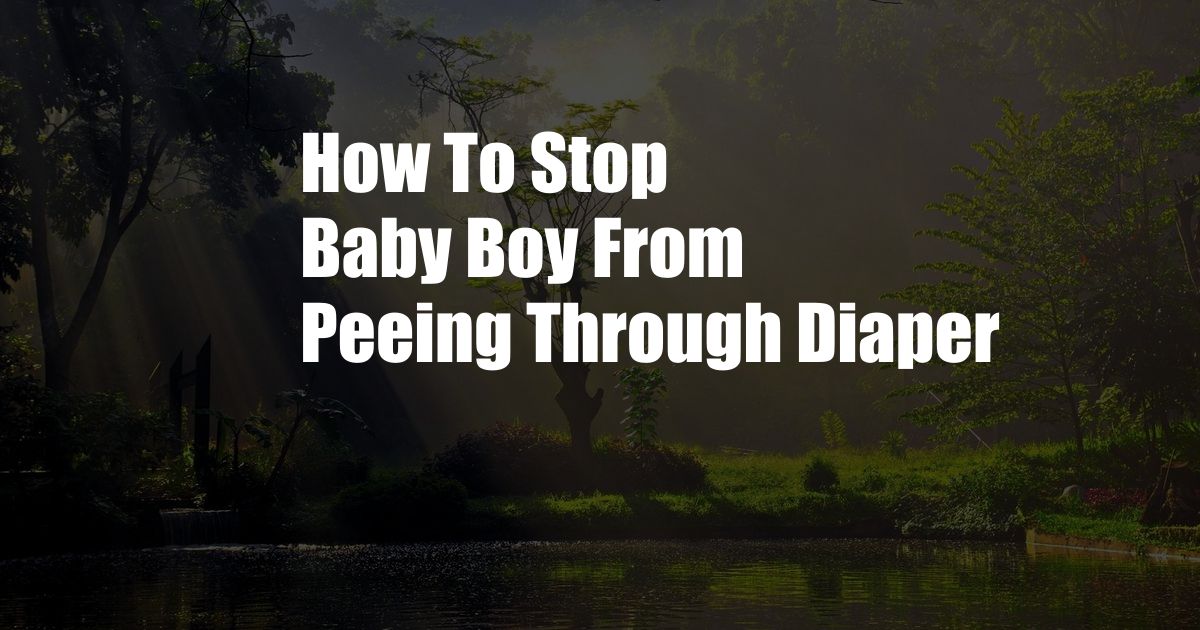
Diaper Dilemmas: How to Stop the Pee-Through Problem
As a parent, diaper changes are an unavoidable part of life. However, when pee starts seeping through your little boy’s diaper, it can be a frustrating and messy problem. Not only is it uncomfortable for your baby, but it can also lead to diaper rash and unpleasant odors. Luckily, there are several effective ways to stop this from happening.
Before diving into solutions, let’s acknowledge that occasional leaks are normal, especially during growth spurts or changes in diet. However, if pee-through is a frequent issue, it’s time to investigate the underlying causes and find a solution.
The Perfect Diaper Fit
The key to preventing pee-through lies in ensuring a snug yet comfortable diaper fit.
– **Check the Diaper Size:** Make sure the diaper size corresponds to your baby’s weight and age. A too-small diaper will be tight and uncomfortable, while a too-large diaper will not provide adequate coverage.
– **Position the Diaper Correctly:** When putting on a diaper, ensure it’s centered on your baby’s bottom and pulled up high enough in the front to prevent leaks.
– **Adjust the Waistband:** Tighten the waistband snugly but not so tight that it leaves marks on your baby’s skin. The waistband should fit snugly around the waist without being constricting.
– **Use Double Diapers:** For babies who tend to leak a lot, especially at night, consider double diapering. This involves putting on two diapers at once to increase absorbency and prevent overflow.
Choose the Right Diaper
Not all diapers are created equal. Consider the following factors when choosing the right diaper for your baby:
– **Absorbency:** Opt for diapers with high absorbency, especially overnight or during longer periods between changes. Look for diapers that feature multiple layers of absorbent material.
– **Leak Guards:** Leak guards are designed to prevent leaks around the legs and waist. Choose diapers with elastic leak guards that create a snug fit and prevent leakage.
– **Materials:** Some babies may be sensitive to certain diaper materials, such as latex or chlorine. Consider hypoallergenic diapers or those made from natural materials like bamboo or cotton.
Additional Preventative Measures
– **Change Diapers Frequently:** Changing diapers every 2-3 hours or as soon as they become wet or soiled helps prevent leaks.
– **Avoid Overfeeding:** Overfeeding can lead to excessive urination, which can overwhelm the diaper’s absorbency.
– **Use Diaper Creams:** Diaper creams or ointments can create a protective barrier on your baby’s skin, reducing the risk of leaks.
Troubleshooting Common Causes of Pee-Through
– **Improper Diapering Technique:** Ensure you’re following the correct diaper-changing technique to prevent leaks.
– **Medical Conditions:** In rare cases, excessive urination may be a symptom of an underlying medical condition. Consult your pediatrician if you suspect a medical issue.
Frequently Asked Questions (FAQs)
**Q: How often should I change my baby’s diaper?**
A: Every 2-3 hours or as soon as it becomes wet or soiled.
**Q: What are the signs of a diaper that is too small?**
A: Red marks or irritation on your baby’s thighs or waist, and frequent leaks.
**Q: Is it safe to use diaper creams every day?**
A: Yes, diaper creams are safe for daily use. However, avoid using petroleum-based products, as they can clog pores.
Conclusion
Preventing pee-through diapers is crucial for your baby’s comfort and hygiene. By following the tips and advice outlined in this article, you can effectively address this problem and keep your little one dry and happy.
Do you have any additional tips or experiences regarding stopping diaper leaks in baby boys? Share them in the comments below and let’s help other parents solve this common dilemma.